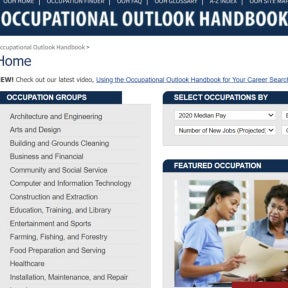What are specialty occupations?
A specialty occupation is one that requires highly specialized training and/or experience. It can also be an occupation that requires at least a bachelor's degree* from an accredited college or university to perform. In fact, there is a separate number of H-1B visas allocated for candidates with a master's degree.
*While a bachelor's degree (or its equivalent) is the minimum educational requirement for a specialty occupation, it must be a degree in a highly specialized field. It should be undeniable that only a candidate with this qualification can perform the role.
What are the specialty occupations that qualify for the H-1B visa?
Agents from the U.S. Citizenship and Immigration Services (USCIS) consult the Occupational Outlook Handbook (OOH) to look for occupations that have already been defined as specialty occupations. This list is, however, not exhaustive.
When applying for an H-1B visa, it is imperative to outline how the role requires a very specific individual to perform it. For example, an individual who has been trained to use specialized equipment, and is one of few people who can operate said equipment, can be considered to perform a specialty occupation.
What is an RFE for specialty occupations?
An RFE is a Request for Evidence. Simply put, it means that your application needs more documentation. The USCIS will send a notice to request specific documents to help make a decision about your application, along with a due date for those documents.
An RFE is issued when the USCIS agent assigned to your case needs further convincing that your vacancy requires a specialized candidate. This request is not necessarily a bad sign regarding your application, but it is important to source and submit the documents asked for if your case is to be successful.
How to Prove a Specialty Occupation:

Five ways in which to prove a specialty occupation.
Proving that a role is a specialty occupation.
Consult the Occupational Outlook Handbook (OOH).

The OOH has a list of occupations that have already been defined as specialty occupations. If the occupation is not listed here, it does not mean that your application will be rejected.
Provide a description of the requirements of the candidate.

Next, an employer can provide a detailed description of the requirements of the candidate. This can include a timeline of the project, daily tasks required of the candidate, documents outlining the purpose of the project, and technical specifications.
Provide a detailed job description.

It is advised that employers also provide a detailed job description that highlights the complexities of the tasks that the candidate will perform.
For example, employers can explain that the candidate will need to extract DNA samples from extremely fragile sources using a rare, complex machine. This shows that only trained professionals can perform the task.
Seek confirmation from an industry expert.

A letter from an industry expert may also prove to be helpful in illustrating the need for an adequately qualified candidate to fill your position. For example, this expert may be able to describe similar vacancies that they have filled and sought out graduates for. Alternatively, they may be able to confirm the complexity of the role and its tasks.
A university professor would be a great choice as an industry expert, as their occupation requires someone with vast knowledge and experience.
State the wage being offered to the candidate.

Another good way to prove that the role is a specialty occupation is by comparing the average salary in this industry to the salary being offered for the position. A role that requires a highly trained individual will offer a more competitive wage than one that requires little to no training.

